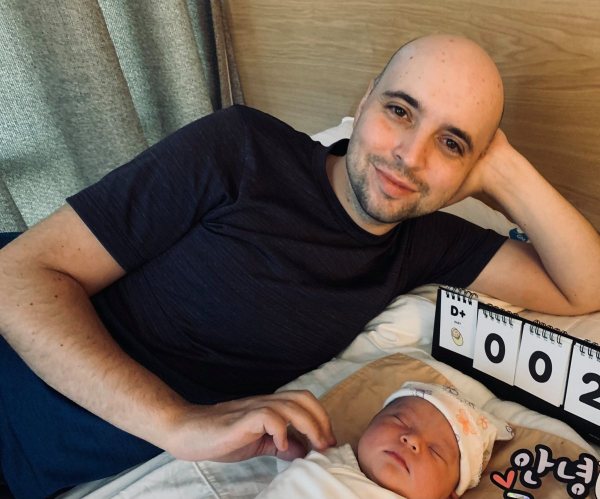
September 2021
This month's voice: Wayne Finley
"A Korean Birthing Story"
Introduction
Lindsay Herron
Editor, KOTESOL Voices
If you've been around KOTESOL in the past several years, you definitely know this month's voice, Wayne Finley. Perhaps you've noticed his eye-catching publicity campaigns, participated in one of his excellent workshops, or found yourself grinning in response to his charming smile at an event. If you're really lucky, you might have seen some of his recent updates on Facebook following his latest adventure: fatherhood! Wayne graciously took some time this month to share a glimpse into the birthing process in Korea, giving us a truly engrossing account of his daughter's entry into the world. Congratulations, Wayne, on the newest addition to your family!
A Korean Birthing Story
Wayne Finley
At around midnight on June 8, 2021, something magical happened. As I was typing away at my computer keyboard, my wife rushed towards me. “I think my water broke!” Uh-oh. Suddenly, I felt like one of those Hollywood action heroes quickly trying to defuse a bomb. Tick-tock, tick-tock, it’s gonna blow. The baby’s coming! Within minutes we were in a Kakao taxi on the way to the hospital in Gwangmyeong.
Labor is no joke. Not knowing anything about birth except the act of conception, I was happy for my wife to lead the way with the birthing plan. She opted for a “natural birth.” Aren’t all births natural? What’s the difference? I learned, in this case, it means no drugs and no medical intervention unless absolutely necessary. Apparently, a lot of births in Korea are induced, and a lot of mothers undergo caesarians. My wife aimed for as natural a birth as possible.
The birthing room surprised me. I thought it would look like a science lab with doctors and nurses wearing green uniforms. No, this looked like a fancy hotel room: queen-sized bed, hot tub, study desk, tea-making facilities…. The only thing it was missing was a flat-screen TV. The midwife arrived and immediately went about her work. She got my wife on the bed and put her in a yoga position to ease the pain while waiting for the baby to arrive. Fifteen minutes later, as I held my wife’s hand, my wife turned to me: “The pain is from another dimension!”
Our midwife had gone into another room. I did my best to soothe my wife with tried-and-true pep talks from years of teaching English. “You can do this!” “Just think how happy you’ll be when you see your baby girl for the first time!” “It’ll all be over soon!” I got an F-grade. The motivational clichés weren’t working. The supposedly calming birthing music playing through a Bluetooth speaker wasn’t helping much, either. As excited as I was for the arrival of my daughter, I was worried for my wife. I felt helpless.
Knock, knock. Who’s there? The doula! Hallelujah! We are saved. Or at least that was my reaction. Doulas are optional; they offer support during labor. They are often recommended for natural births. She came into the room as if she had seen this scene a million times. First, it was the breathing techniques, the aromatic oils, and the nice words; then came the yoga-looking exercises; and then she started running the hot tub... and it all worked. My wife’s pain subsided. Like a great teacher managing a classroom of unruly kids, the doula was managing this labor. She owned it. It was as though she possessed a magic maternity wand.
A few short hours later and there she was. Our daughter. Nine months in the making. My initial reaction was more amazement than euphoria. “Wait, what? I’m a father now?” Until seeing her, she was a conception. An idea. A dream. Now she was real, and she was breathing air for the first time. Not knowing how to talk to babies at all, I just said “hello” in one of those cute baby voices you hear parents do. It was a surreal experience seeing her and talking to her for the first time.
My wife and I were then moved to a different room on another floor. This one actually was a hotel room—flat-screen TV, the works—but it had a crib in it. Our daughter was taken care of around the clock by nurses with other babies in a secret room; but if we wanted to see her, we just had to make a call and they’d bring her to our room. It was like ordering room service, except instead of getting a hamburger they’d bring a beautiful baby. Labor took its toll on my wife; she could hardly move that first day, and I didn’t want to leave her side. In full credit to my university, they permitted me to stay in the hospital, and one of the office staff invigilated a final exam for me. Moments like that really make you appreciate your employer.
The coronavirus pandemic cut time short with my wife and daughter. Two days after the birth, we were in a car on the way to the postpartum center. In Korea, they are also called “maternity hotels.” They help new mothers recuperate. Meals are provided; nurses take care of the babies; and when there’s no pandemic, there are parental training classes. It’s like living on a cruise ship for a couple of weeks, but with babies. Sadly, fathers were not allowed inside due to coronavirus fears, and so my only contact with them was through video calls.
If you are having a baby in Korea, relax. From studying the ultrasounds to going into labor to enjoying yoga classes in a maternity hotel, the whole experience is an adventure. The only advice I can offer is to research your options. There are so many hospitals all vying to deliver your baby in different ways. Want a water birth? No problem. Au naturel? Step right this way. Just know that the rarer the choice, the fewer the hospitals. Our natural birthing hospital was a 30-minute taxi ride from our apartment.
Oh, and one final piece of advice: start saving up. From the moment that line appears on the pregnancy test, babies are not cheap! The good news? It’s worth every penny and more.

About the Author
Wayne Finley is a teacher, teacher trainer, and speaker. In Korea TESOL, he is the coordinator for the KOTESOL Teacher Training (KTT) program and the national Publicity Committee chair. At Korea Polytechnic University, he is an assistant professor teaching courses in English language and international relations. At home, he is the devoted father to a beautiful three-month-old girl.


